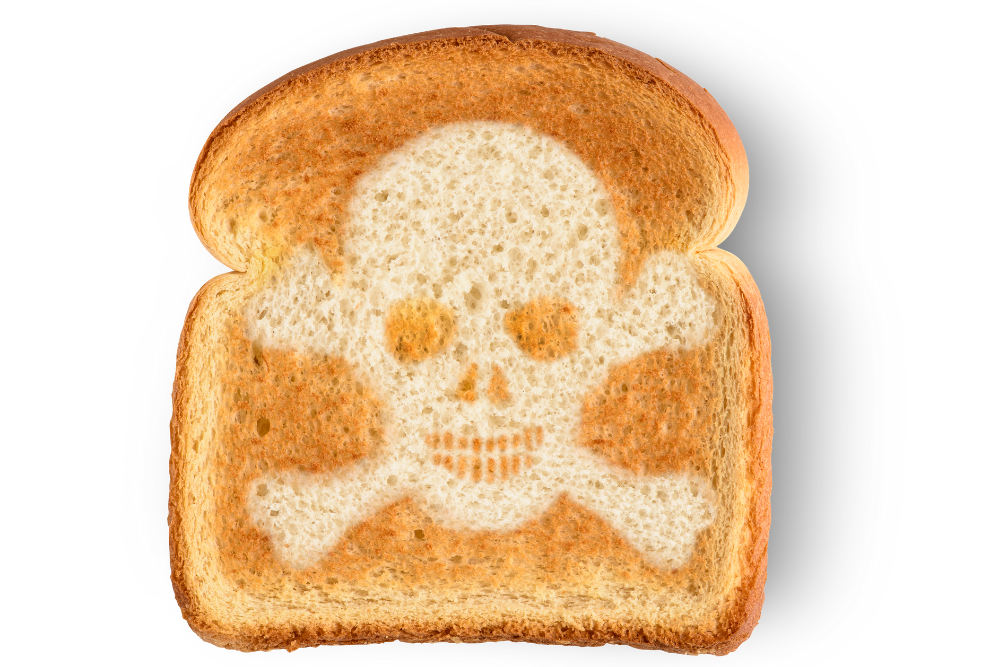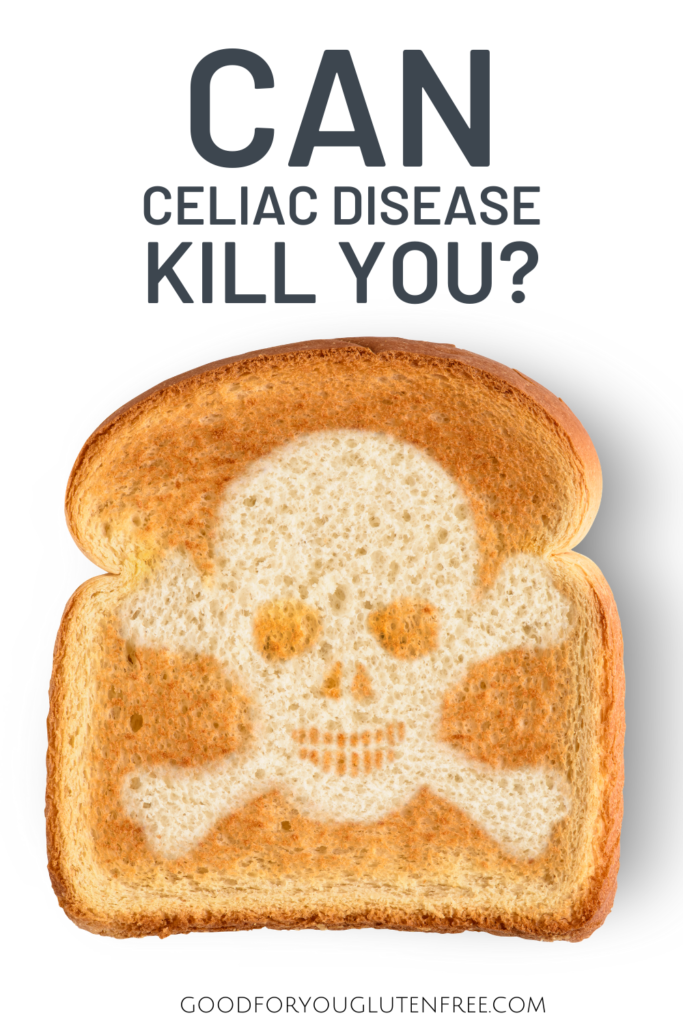
Millions of people suffer from celiac disease worldwide, and the only treatment option is a gluten-free diet. A lot of people wonder if celiac disease can kill you and what harm does it really do to your body? This post will attempt to answer your most pressing questions. This article is not a substitute for medical advice from your physician. This post contains affiliate links. Please read my disclosures and disclaimers.
Celiac disease is a rare autoimmune disease that impacts approximately 1 percent of the worldwide population. In the U.S., 1.8 million people have celiac disease, although 1.4 million people don’t know they have it (yet) and remain undiagnosed.
The only treatment option for those diagnosed with celiac disease is a strict, gluten-free diet. Gluten is a protein found in wheat, rye, barley, and derivatives of these grains. Following a strict gluten-free diet is considered a high treatment burden and also bears a large emotional burden for those who must abide by the restrictive diet.
It’s also difficult to follow the gluten-free diet as strictly as it must be followed. In fact, even the strictest gluten-free dieter gets accidentally glutened from time to time because gluten is hidden in packaged foods, found in difficult-to-understand ingredients, poorly labeled products, and via cross-contamination.
Gluten also is a real threat when eating out. In fact, 1 in 3 restaurant meals labeled as “gluten-free” actually contain gluten, according to this study published in the American Journal of Gastroenterology.
People with celiac disease often experience uncertainty about their health and long-term prognosis.
Can celiac disease kill you or cause early death? Can celiac disease cause cancer? What are the long-term consequences, if any, of celiac disease?
And what if you don’t follow a strict gluten-free diet, are you really worse off than those that do?
This article will get to the bottom of it all.

What is Celiac Disease?
I have written extensively about celiac disease and encourage you to read my book or this article to learn more about the disorder.
In a nutshell, celiac disease is a rare, genetic autoimmune disease caused by gluten. When someone with celiac disease eats gluten, the body’s immune system becomes confused and launches an attack at the healthy tissue (villi) surrounding the small intestine.
The small intestine is an essential organ for absorbing nutrients from food and distributing those nutrients to every cell in the body. It basically feeds all your other organs.
When the small intestine is impaired, as it is in people with celiac disease, patients suffer from a slew of gastrointestinal systems, skin disorders, bone density issues, nutrition disorders, and more. There are hundreds of symptoms of celiac disease, and the disorder can manifest itself in a variety of ways beyond classic symptoms such as bloating and diarrhea.
Effectively Managing Celiac Disease
The only treatment for celiac disease is to eliminate the exact food that triggers that autoimmune reaction… and that food is gluten. Gluten is a protein found in wheat, barley, rye, spelt, and derivatives of these grains.
Many celiac disease patients who eliminate gluten go on to fully or mostly heal their small intestines from the destruction caused by gluten. I have personally put my celiac disease into remission.
Remission means the patient no longer experiences the symptoms associated with celiac disease nor incurs continued damage to their small intestine. Even patients with asymptomatic or silent celiac disease who do not experience the physical symptoms of the disease are still damaging their small intestines and impairing nutrient absorption, which will eventually lead to more disease.
Unfortunately, a good number of people following a gluten-free diet never experience complete intestinal healing. In fact, a study published in the American Journal of Gastroenterology demonstrated just how difficult it is to heal the small intestine post-celiac disease diagnosis.
The researchers found that of the 241 adults with biopsy-proven celiac disease, only 34 percent of them experienced confirmed mucosal recovery after two years following their diagnosis and 66 percent after five years.
Many experts suspect that the small intestine is slow to heal due to the ongoing consumption of low levels of gluten that might come from cross contamination, medications, or even gluten cheat days where people with the disorder don’t take their diet as seriously as they should.
In fact, in a survey of 1,000 people following a gluten-free diet, nearly 78 percent of the respondents describe their diet as “very strict”, yet 44 percent say they “would” or “maybe would” eat something that came in contact with gluten. This admission might account for why healing takes so long for celiac disease patients.
Do I Have to Follow a Strict Gluten-Free Diet?
A lot of people in the celiac disease community wonder if the effort to eat gluten-free is worth it. Following a strict gluten-free diet is a major inconvenience and buzz-kill.
The truth is, and as you’ll read below, celiac disease itself doesn’t heighten your risk of early death. What it does, instead, is put you at risk for a slew of other diseases that will eventually cause health challenges. You may not die from celiac disease, per se, but you may die of irreversible damage and complications stemming from the original disorder.
For example, many people with celiac disease find themselves collecting other autoimmune diseases. In fact, if you’re diagnosed with celiac disease as an adult, you have a 34 percent chance of getting a second autoimmune disease, according to Celiac.org.
The most common autoimmune disorders associated with people with celiac disease include type 1 diabetes, Hashimoto’s thyroiditis, multiple sclerosis, autoimmune hepatitis, Addison disease, arthritis, idiopathic dilated cardiomyopathy, Berger’s disease, and Sjogren’s syndrome.
Not only can untreated celiac disease lead to other serious, life-threatening autoimmune diseases, but it can also lead to a slew of other long-term health conditions and consequences, according to the Celiac Disease Foundation.
These disorders and complications include but are not limited to anemia, osteoporosis, infertility or miscarriage, vitamin and mineral deficiencies, nervous system disorders, pancreatic insufficiency, intestinal lymphomas, and other gastrointestinal cancers, gallbladder malfunction and neurological manifestations, including ataxia, epileptic seizures, dementia, migraines and more.
Early diagnosis of celiac disease is crucial in preventing such complications from occurring. The earlier an individual is diagnosed with the disorder, the earlier he or she can begin to manage it and deter future disease(s).
According to the non-profit organization United European Gastroenterology, “Physicians should advise all patients with coeliac disease about the risks of voluntarily introducing gluten, in terms of complications (such as refractory celiac disease, enteropathy-associated-T-cell lymphoma [EATL], small bowel adenocarcinoma and ulcerative jejunoileitis), whereas resuming a strict gluten-free diet normalizes clinical and morphological (duodenal histology) features, preventing the possible occurrence of the above-mentioned complications.”
Can Celiac Disease Kill You?
Many people wonder, “Can celiac disease kill you?” The good news is that people with managed celiac disease generally have good outcomes. If caught early, many of the symptoms of celiac disease are reversible, and the disease won’t progress into more serious, life-threatening disorders.
While some studies have found a modest increase in the death rate for those with celiac disease, other research suggests otherwise.
In fact, some research suggests that patients with celiac disease are not at higher risk of death if they (a) experience no symptoms and (b) were diagnosed by screening or early when they were experiencing only mild symptoms.
A team of researchers at the Celiac Disease Center in the Department of Medicine at the Columbia University Medical Center also set out to determine whether celiac disease is linked to a higher overall mortality rate. The researchers examined 49,829 Swedish patients with a mean age of 32. All patients were observed for 12.5 years and had biopsy-confirmed celiac disease.
The researchers concluded that people with celiac disease have an increased mortality risk of 9.7 per 1,000 persons, which is higher than the 8.6 deaths per 1,000 person rate for the general population. This is a small but statistically relevant increased risk.
Cancer Risk and Celiac Disease
While it’s true you have a higher-than-normal risk of getting non-Hodgkin’s lymphoma, a cancer of the lymphatic system, if you have celiac disease, the risk is still low, particularly those following a gluten-free diet and managing their diet – and disease – well.
According to information on Celiac.org, studies in the US and UK have found that the risk for malignancy at approximately 1.5 times higher in people with celiac disease than in the general population.
However, the promising news is that for those managing their celiac disease symptoms well through diet, the risk of many types of cancer actually decreases!
A 2014 study in Finland published in The American Journal of Gastroenterology examined data from more than 30,000 people living with celiac disease and found that people with celiac disease had a “somewhat smaller risk of malignancy” than the general population, although the risk for malignancy increased after five years post-diagnosis.
They found celiac patients experienced a greater risk of getting small-intestinal cancers and colon cancer. Furthermore, researchers found that patients with celiac disease had a lower risk of breast, lung, pancreatic, renal, and bladder cancers.
Refractory Celiac Disease
The prognosis and outcomes are generally good for someone with celiac disease whose body is responding well – even if gradually – to the gluten-free diet.
However, when a celiac patient is non-responsive to the treatment of the gluten-free diet, the disease becomes much more serious and life-threatening. Celiac patients who are not responsive to the gluten-free diet are further diagnosed as having refractory celiac disease (RCD).
According to the National Organization for Rare Disorders, RCD is an autoimmune disorder like celiac disease. However, patients with RCD are resistant or unresponsive to the gluten-free diet for 12 months or longer.
People with celiac disease are typically able to heal the mucosal lining of the small intestine through a strict gluten-free diet, enabling them to restore their bodies back to functioning optimally.
However, patients with RCD are resistant to this treatment (the gluten-free diet), and their small intestines do not heal. They continue to suffer from painful symptoms and complications stemming from malabsorption issues.
Symptoms of refractory celiac disease are similar to patients with untreated celiac disease, although many patients describe them as more severe and/or disabling. Symptoms include weight loss, diarrhea, abdominal pain, malnutrition, and anemia, according to NORD.
While only 1-2 percent of people with celiac disease will develop RCD – and RCD patients are almost always over the age of 50 – the prognosis for refractory celiac disease is not good. The overall five-year cumulative survival rate is only 70 percent.
The Bottom Line
While celiac disease itself may not cause a greater risk of cancer and early death, if unmanaged, it can lead to a slew of painful, symptomatic, and sometimes deadly disorders.
If you have celiac disease, the only treatment option is a strict gluten-free diet. Removing gluten from your diet will heal your small intestine, enable you to absorb nutrients properly, and live a symptom-free life.
The good news is that people with managed celiac disease go on to live long and healthy lives, especially those who are properly managing their disorders through diet.
Bottom line: If you have celiac disease, and your body is responding to the gluten-free diet, your prognosis is good.
However, if you’re not following a strict gluten-free diet, but you have celiac disease, you may want to read what happens if you choose to continue to eat gluten instead.
More Articles on Celiac Disease
Read these articles to learn more about celiac disease:
- What is Celiac Disease?
- Celiac Disease Rash (Dermatitis Herpetiformis) Explained
- 12+ Must Read Books about Celiac Disease and Gluten-Free Living
- Free Sample Celiac Disease Meal Plan
- 200+ Foods You Can Eat on the Gluten-Free Diet
- 10 Surprising Celiac Disease Myths Debunked
- 10 Signs and Symptoms of Celiac Disease
- Is Celiac Disease Genetic?
- Can Celiac Disease Go Away?
Leave a Comment